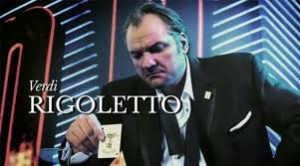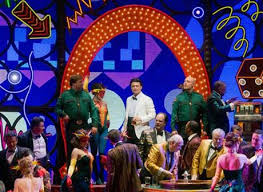Known for elaborate and exciting production, the Metropolitan Opera in New York exudes drama. In a year that celebrates major anniversaries for both Verdi and Wagner, the MET launched new productions of classics like Rigoletto – in part reaching out to the Under-40 audience. With Rigoletto, they hit the jackpot, communicating the tragic injustice and complex layers of social sin and power in an eerily contemporary setting.
(Trailer: http://www.youtube.com/watch?v=IggJUo2s8K0)
Written in 1851 but set in 16th Century Italy, Rigoletto is a story of lust, manipulation and patriarchy. The title character, Rigoletto is a hunchback and court jester -his job is to poke fun at the idiosyncrasies and faults of others. His master, the Duke, exerts and emphasizes his power sexually. The opera opens with him sharing his sexual exploits – he can tempt any woman and enjoys it. For this reason, Rigoletto has long hid his daughter from the Court. Desperately trying to keep his daughter unknown to the Duke, she lives a cloistered existence – venturing out only to go to church.
Gilda, innocent and unaware, does not realize that the handsome young man is: the duke, a womanizer, married, dishonest, dangerous, and manipulating her. Thus the tragedy begins, caught between the hated man whose trying to protect and hide her (Rigoletto) and the evil but seductive man who views her as his latest toy and prize – Gilda is trapped. She does not realize the magnitude of everyone’s hatred for her father – until she is kidnapped and delivered to the duke (the mob thinks it is handing over Rigoletto’s girlfriend as a treat for the duke). When freed, she cannot get over the fact that she loves the Duke (who used her, is married, and quickly goes off to his next conquest).
In the beautiful and famous aria – la donna e mobile – the Duke sings (in the new production, from a Vegas stripclub…)
Always miserable
is he who trusts her,
he who confides in her
his unwary heart!Yet one never feels
fully happy
who from that bosom
does not drink love!Woman is flighty.
Like a feather in the wind,
she changes her words,
and her thoughts!
And yet, Gilda is faithful and loyal. She has fall in love and will give her life to save him from the assassin’s knife. This is juxtaposed by the Duke’s interchange at the very beginning of the opera – where he brags about sleeping with the Count’s wife. When cautioned to be quiet, lest the Count hear and inform the Duke’s wife, he responds:
That wouldn’t worry me at all.
Neither is any different
from the rest I see around me;
I never yield my heart
to one beauty more than another.
Feminine charm is a gift bestowed
by fate to brighten our lives.
And if one woman pleases me today,
tomorrow, like as not, another will.
Fidelity – that tyrant of the heart –
we shun like pestilence.
Patriarchy and power is packaged; however, in the glitz and glamour of 1950s Las Vegas – and the Duke, inspired performance channeling the suave veneer of Sinatra. The vision of director Michael Mayer is intended to make a contemporary audience relate to Verdi and he is incredibly successful. The glitz and glamour draw you in – you are seduced by Duke in a way that an “originalist” setting of 16th century does not. The powerful and iconic music – draws you in no matter the setting – and yet, the METs new production does not allow you to see Verdi’s opera as simply an artistic masterpiece of the past – it is a current struggle of tragedy, injustice and patriarchy.
By the end of Rigoletto, I was angry and disgusted – but I think that was Verdi’s point. Currently, we are having a lot of conversations about rape culture, college campuses, and patriarchy. In the aftermath of Steubenville, a national problem in how young men and women are taught about rape and sex was exposed. How is it that sex with an unconscious woman is not obviously rape to EVERY ONE. A deep problem in the way we are teaching young people about rape was exposed. This is not a new problem, however, as Rigoletto makes clear.
Power exerted over others is not always dictatorial and outwardly violent – the Duke is charming and seductive – but his power still has a punch. In Otello, Verdi teaches us about jealousy. In Rigoletto, Verdi communicates a powerful critique of patriarchy and a seductive (yet equally oppressive) version of power. If you get a chance to see the new Rigoletto (either in person or in HD), I highly recommend it. We can learn an important lesson about the dangers of being seduced by patriarchal power.







Trackbacks/Pingbacks